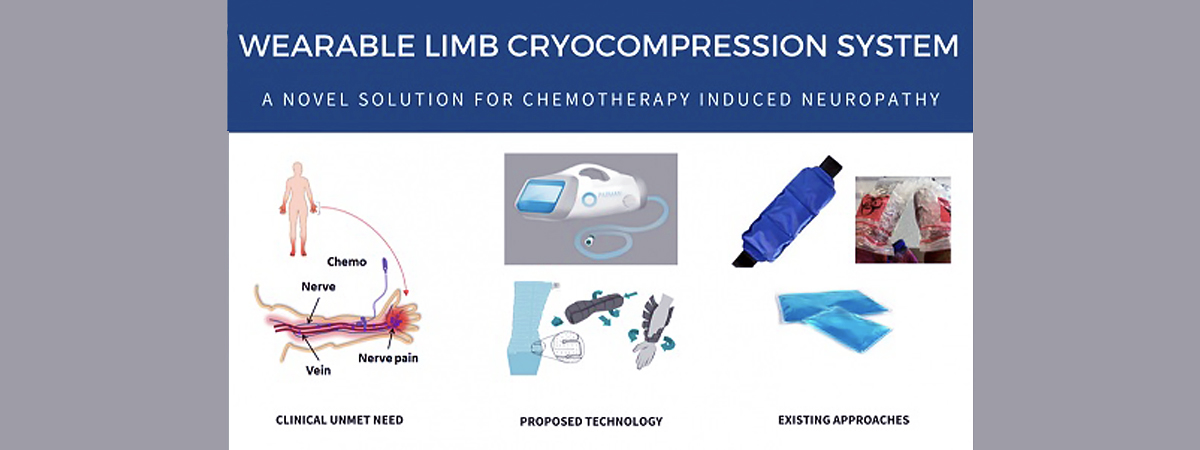Dr Ertu Unver and his research team have been involved in the project from a product design perspective to develop a device that may prevent or reduce numbness and pain caused by certain types of anti-cancer therapy, as part of the multidisciplinary research and development group within the University’s PAXMAN Scalp Cooling Research Centre
A TEAM of clinicians and scientists from the National University Cancer Institute, Singapore (NCIS) at the National University Hospital (NUH) and the N.1 Institute for Health at the National University of Singapore (NUS), has partnered with Paxman Coolers Ltd who in turn sought the product design expertise of the multidisciplinary research and development group within the University of Huddersfield’s PAXMAN Scalp Cooling Research Centre, to develop a device that may prevent or reduce numbness and pain caused by certain types of anti-cancer therapy.
Chemotherapy-induced peripheral neuropathy (CIPN) is a severe side-effect of chemotherapy drugs called taxanes, which are used to treat common cancers such as breast, lung, ovarian and stomach cancer. CIPN affects about 1.4 million cancer patients globally every year.
CIPN causes progressive and often irreversible pain or sensitivity in the hands and feet of patients undergoing chemotherapy leading to delays and discontinuation of treatment. It contributes to long-term poor patient well-being and significantly increases economic burden in terms of healthcare costs. The condition also leads to loss in work productivity, as affected patients are unable to return to work quickly.
Unmet clinical need
Few to no prevention and treatment strategies exist for CIPN. Recently, cryotherapy (or cooling) of the limbs during chemotherapy demonstrated a protective effect by preventing/reducing CIPN severity. However, the currently used frozen gloves or ice packs are not user-friendly, deliver unstable cooling and can cause severe frostbite. There is a need for a medical device developed for patients’ use in a chemo suite and which can deliver stable cooling, tolerable over the entire duration of the chemotherapy.
A novel solution for CIPN
In collaboration with PAXMAN, the Singapore research team from NUHS comprising clinicians and researchers from the Department of Haematology-Oncology at NCIS and NUH, and the N.1 Institute for Health at NUS are developing a portable limb cryocompression device specifically targeting prevention of CIPN in cancer patients.

The team has studied various proof of concept aspects of the cryocompression technology, over the past eight years, previously supported by the National Health Innovation Centre Singapore (NHIC) through its Innovation to Develop grant. Working together as a team since 2019, PAXMAN, global leaders in scalp cooling for prevention of chemo-induced hair loss, was identified as the ideal commercialisation partner for the project.
The research team was awarded a translational grant from the National Research Foundation (NRF) Central Gap Fund in May 2021, which will be administered by NHIC. Pilot studies will commence in 2022 to investigate the device in healthy volunteers and cancer patients undergoing CIPN-causing chemotherapy. The efficacy of prevention will be monitored using various clinical and patient-reported outcomes.
“This funding is a testimony to the huge impact the new product will have on the quality of life for cancer patients receiving taxane-based therapies, not only in Singapore, but throughout the world,” commented PAXMANS CEO, Mr Richard Paxman, who added: “This will allow the collaborative team not only to crucially accelerate the research and development process but will also significantly de-risk the project from a commercial perspective.
“Paxman is determined, not only to provide patient access to scalp cooling technology to prevent chemotherapy-induced hair loss globally, but to also give patients the chance to reduce or prevent the debilitating side effect of peripheral neuropathy.
“We bring to this collaboration extensive expertise in design, development, manufacture, regulatory approval, along with experience of commercialising medical cooling devices. The company is perfectly placed to roll out this technology to its existing and growing customer base throughout the world,” he said.

Principal Investigator Assistant Professor Raghav Sundar, Consultant at the Department of Haematology-Oncology at the National University Cancer Institute, Singapore (NCIS) and Investigator at The N.1 Institute for Health at NUS, said: “This collaboration will have a significant and broad impact. By preventing or reducing CIPN, the overall health and quality of life of cancer patients will be significantly enhanced, during and after chemotherapy. The treatment of CIPN is an unmet and increasingly urgent clinical need, and a preventative solution will hopefully improve patient quality-of-life.”
Co-Principal Investigator Dr Aishwarya Bandla, Head of Translational Tx Core at The NUS N.1 Institute for Health, added: “This international multidisciplinary collaboration brings together complementary cross-sector expertise from the hospital, academia, and industry. The overall product-development process will utilise a patient-centred approach, placing the patients’ safety and efficacy at the heart of the design process.”
More from the School of Art, Design and Architecture
More from the School of Art, Design and Architecture - 0 articles matching your search
More from the School of Art, Design and Architecture - 1 article matching your search
More from the School of Art, Design and Architecture - {{numberOfPosts}} articles matching your search
